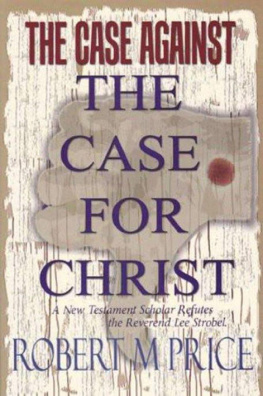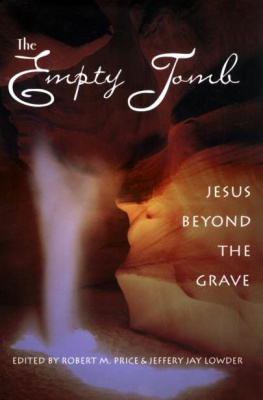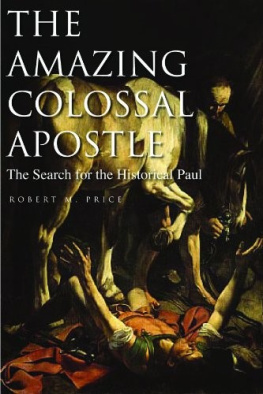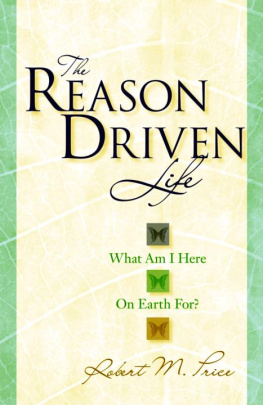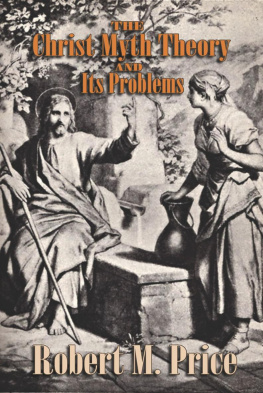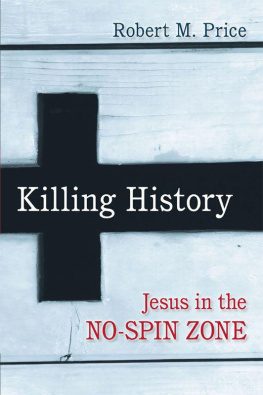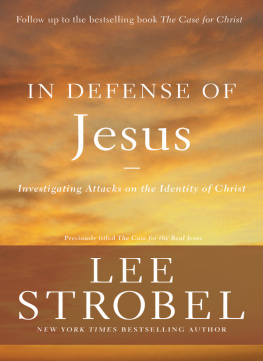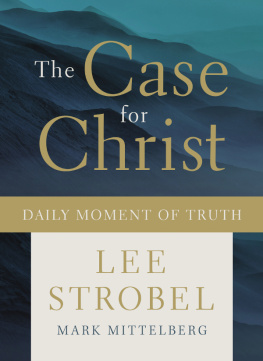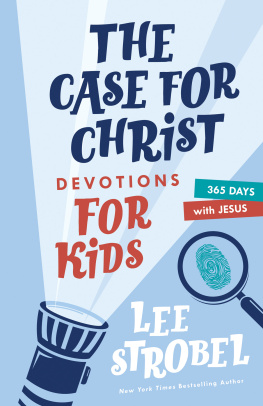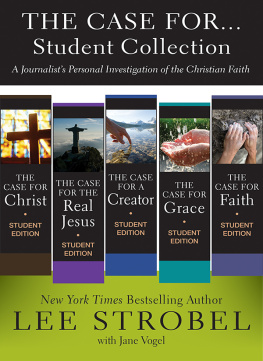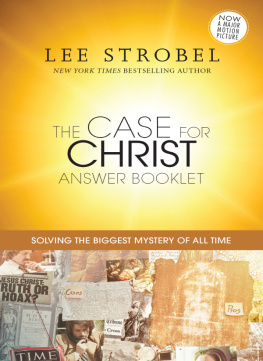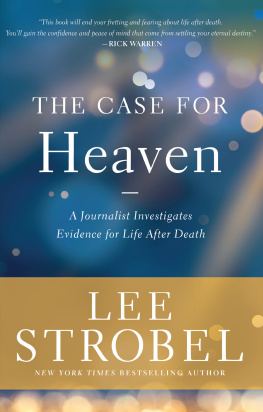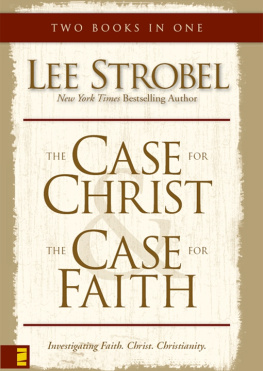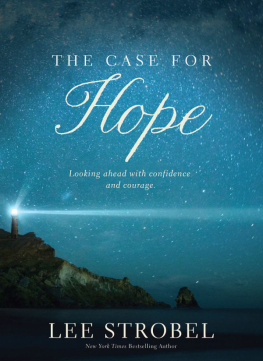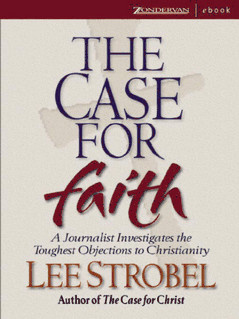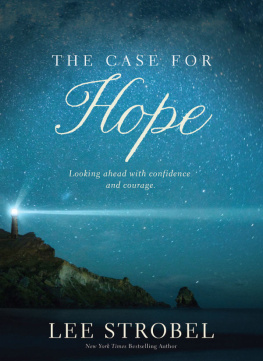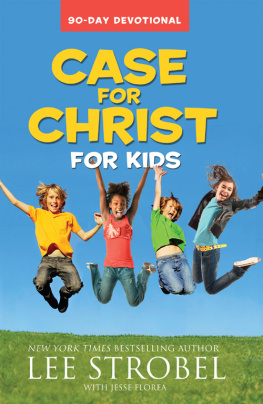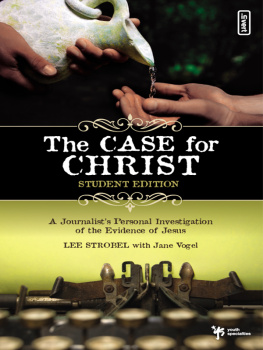The Case Against The Case for Christ :
A New Testament Scholar Refutes
Lee Strobel
ROBERT M. PRICE
2010
American Atheist Press
Cranford, New Jersey
ISBN10: 1-57884-005-8
ISBN13: 978-1-57884-005-2
American Atheist Press
P.O. Box 158
Cranford, NJ 07016
Voice: (908) 276-7300
FAX: (908) 276-7402
www.atheists.org
Copyright 2010 by American Atheist Press, all rights reserved. No part of this publication may be reproduced, stored in a retrieval system, or transmitted in any form or by any means, electronic, mechanical, photocopying, recording, or otherwise, without prior written permission of the publisher, except in the case of brief quotations embodied in critical articles and reviews.
Published February 2010
Printed in the United States of America
Library of Congress Cataloging-in-Publication Data
Price, Robert M., 1954
The case against the case for Christ: a New Testament scholar refutes Lee Strobel / Robert M. Price.
p. cm.
Includes bibliographical references and index.
ISBN-13: 978-1-57884-005-2 (alk, paper)
ISBN-10: 1-57884-005-8 (alk paper)
1. Strobel, Lee, 1952- Case for Christ. 2. ChristianityControversial literature. 3. Jesus ChristPerson and offices. 4. Jesus ChristHistoricity. I. Title.
BT203.S7737 2010
232.908dc22
2009054035
Dedicated To
My Generous Friend
David F. Parks
Ebook versions by John F. Felix, jffelix61@gmail.com
Contents
INTRODUCTION
My Own Investigation
Y ou might want to know this. It might help you to evaluate what follows. You see, though it is obvious I disagree drastically with the Reverend Lee Strobel since I am attempting to refute him, I did not start my journey where he did, as a skeptic and an atheist. In fact, I began where he ended up and arrived at his abandoned starting point. I prayed to receive Jesus Christ into my heart as my personal savior, as my Sunday School teacher told me I should, at eleven years old. Surpassing my young contemporaries, I waxed bold to witness to my faith to all who would listen: schoolmates, people sitting next to me on the bus, people to whom I handed out evangelistic tracts in public places, etc., etc. I had my daily devotions and confessed any unkind or risqu thought as soon as it popped onto my mental monitor. I pored over scripture every day, seeking edification in the straightforward teachings of the New Testament and allegorizing the Old. I loved church and attended three services a week. It consumed me, but I dont want to make it sound bad. I was an adolescent zealot, but it kept me out of trouble and instilled within me a long-lasting love for the Christian tradition, a sense of duty to the Christian ethic, and an endless fascination with the Bible. I still study it avidly in the hopes of understanding it ever better.
I remember when I first learned, with a sense of surprise and relief, of Christian apologetics: the defense of the faith by appealing to its historical credentials. I was satisfied with faith (which these days I would call supposition), but if there was good data, good reason, for believing that it all happened, well, so much the better! And I saw immediately the advantage of apologetics for evangelism. I could appeal, not to mere subjectivism, but to the facts. And it frustrated the daylights out of me when friends to whom I explained the evidence for the resurrection did not accept the case I made. How could they be so blind?
Ironically, my doubts and questions were a direct outgrowth of this interest in apologetics. I knew it was a matter of basic honesty that I had to place myself, for the moment, in the shoes of the unbeliever if I were to evaluate each argument for the historical Jesus, or for Bible accuracy. I knew it would be phony for me to try to convince others by using arguments that I did not actually think were cogent. I didnt want to use any tactic, say anything that might work, as if I were a used car dealer or a mere propagandist. Obviously, at first I thought the arguments I was picking up from reading John Warwick Montgomery, were pretty darn good! But once it became a matter of evaluating probabilistic arguments, weighing evidence, much of it impossible to verify, much of it ambiguous, I found it impossible to fall back on faith as I once had. And this tormented me. I knew I was slipping back from preaching good news to entertaining good views. I was the leader of my campus InterVarsity Christian Fellowship group. I was their chief planner of evangelistic events. And I was increasingly depressed about the nagging question: What if Im wrong? As good as it looks, I might be wrong ! And faith was eluding me, slipping away.
Again ironically, all this was happening at the very time my wider acquaintance with Christian literature was showing me that evangelical Christianity was an interesting and comprehensive worldview. I was excited to be associated with it if it were true! For a few years in the mid-seventies, I made it my business to visit and interview evangelical writers and leaders whenever I could. I sought their wisdom, not least to buttress my uneasy faith.
So you see, I embarked on a series of meetings with remarkable men not dissimilar to Lee Strobels. During these years I gratefully received the wisdom of luminaries including Carl F.H. Henry and Harold John Ockenga, great pioneers of the neo-evangelical movement, Billy G. Melvin, then president of the National Association of Evangelicals, spiritual writer Peter H. Gilquist ( Love Is Now and Farewell to the Fake I.D. ), Pentecostal New Testament scholar Larry W. Hurtado, theological historian Donald W. Dayton, Pentecostal Old Testament scholar Gerry Shepperd, Jim Wallis, editor of The Post-American , then Sojourners ; Reformed theologian David F. Wells, apologist and theological critic Clark H. Pinnock, theologian J.I. Packer, evangelical New Testament scholar Merrill C. Tenney, young evangelical pundit Richard Quebedeaux, fundamentalist-turned Episcopalian-turned Roman Catholic philosopher Thomas Howard, Christian World Liberation Front founder Jack Sparks, and renowned New Testament specialist James D.G. Dunn. I even got most of them to autograph my New Testament!
A few years later, I had the privilege of taking graduate courses with evangelical savants Bruce M. Metzger and Gordon D. Fee, not to mention more liberal scholars like Helmut Koester, Howard Clark Kee, Harvey Cox, and Monika Helwig. (Most of the people Lee Strobel would later interview were not writing yet, but recently I have debated Greg Boyd, William Lane Craig, Craig Blomberg, and Michael Green.)
Ultimately I reached a different set of conclusions than Lee Strobel did. It puzzles and exasperates me, I will admit, as I read his accounts of his discussions with apologists, as the accumulating arguments he says won him to evangelical Christian faith were the very same ones that I found so unreliable, such weak links, limp reeds upon which to rest either faith or opinion. I have now arrived at the point where I hold no religious beliefs at all, even while cherishing the various religions as beautiful and profound products of human cultural creativity. They start creating dangerous mischief, however, when they entertain delusions of grandeur: namely, that their doctrines and symbols are literally true and that those of other religions are false. That is the literalistic fundamentalism to which I believe Lee Strobel has allowed himself to be converted, and to which he seeks mightily to win others. It is a mistaken conclusion based on a grossly slanted reading of the relevant evidence, as I hope to show in this book.
I was quite disappointed when I saw how first this apologetical argument, then that one, then pretty much all of them, turned out not to hold water, not to make sense. But the predicted despair did not follow. Instead, I found myself gazing in wonder at a world around me in which there was no curtain sealing off the saved from the damned, in which intellectual freedom knew no prescribed limits of orthodoxy, and in which there was no party-line I felt I had to defend. People were just people; opinions were just opinions, and the whole patchwork was dazzling! I never expected that when I teetered on the brink of what I once called unbelief I would be very much afraid Christian faith would turn out to be false or insupportable. But when I concluded just that, I was no longer scared. I hope my Christian readers will cast out their fear in favor of love the love of truth, whichever way it leads. We must follow it wherever it seems to go. We must not, like Lee Strobel, ride it like a horse, flogging it to go in the direction we desire.
Next page
